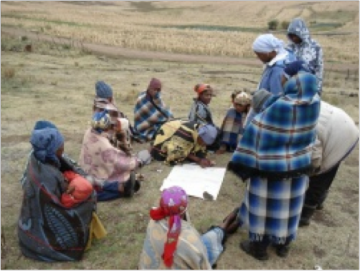Climate adaptation in the mountains of Lesotho


Community mapping exercise in Lesotho: Photo Anna Taylor
Anecdotal evidence collected from community members in the Highlands of Lesotho indicate a keen awareness of longer term changes in the local climate and the need to adapt in response to these. The annual snowfall is said to be decreasing, the winters shorter and summers warmer. Climate variability and change is however only one of a number of factors affecting the changing vulnerability of these populations, not least of which are the impacts of the large dam building projects that have taken place. The provision of basic services (including healthcare, schooling, water and sanitation) and access to employment remains severely limited. This can make development initiatives difficult to distinguish from specific climate change management activities. For example, in 2004 the Lesotho Highlands Development Authority introduced apple trees to the area, both for consumption and for sale. Whether new and future climate conditions were considered when selecting the crop and crop variety to introduce is not clear. At a similar time a new variety of maize was introduced to improve yields and training was held on agricultural practices and the marketing of produce.
Livestock farming is a dominant livelihood activity and people are sensitive to the deterioration of rangelands and wetlands (used as watering posts). Whether caused by environmental change and/or mismanagement, local solutions are being sought, including adapting traditional rotation schemes to close off certain areas for longer. The departments of Rangelands Management and Water Affairs are both working to develop new rangeland and wetland management strategies that include broad stakeholder engagement. One of the options being pursued is reducing the number of livestock being kept in the highlands. While farmers are accepting of the idea of destocking, they are resistant to putting it into practice unless appropriate support is provided, including improved access to alternative livelihood strategies (particularly income generating activities). There are also notable challenges to adopting these new management practices associated with existing tensions between levels of traditional leadership and government.
SEI’s work in Lesotho, which forms part of the EC NeWater project, was recently used as the basis for a feature story on the UN OCHA Integrated Regional Information Networks (IRIN) news site, Lesotho: A village tries new ideas to beat climate change, http://www.irinnews.org/Report.aspx?ReportId=80365

Comments
There is no content